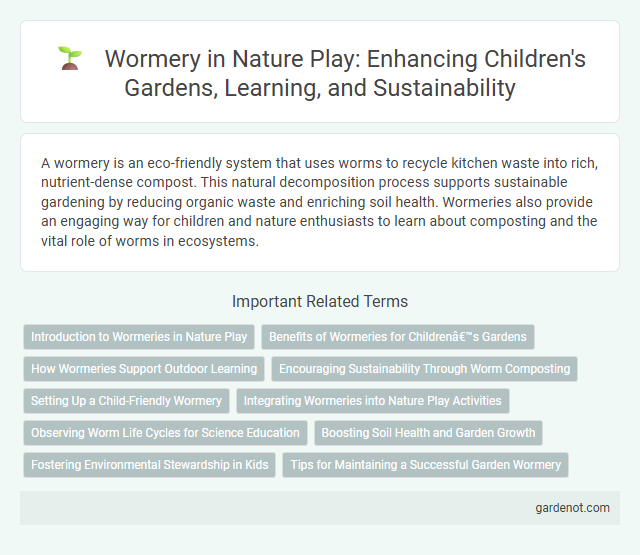A wormery is an eco-friendly system that uses worms to recycle kitchen waste into rich, nutrient-dense compost. This natural decomposition process supports sustainable gardening by reducing organic waste and enriching soil health. Wormeries also provide an engaging way for children and nature enthusiasts to learn about composting and the vital role of worms in ecosystems.
Introduction to Wormeries in Nature Play
Wormeries create a dynamic ecosystem where children can observe and interact with composting worms, enhancing their understanding of natural decomposition and soil health. Integrating wormeries into nature play promotes hands-on learning about sustainable waste management and nutrient recycling. This interactive tool fosters curiosity about biology and environmental stewardship in outdoor educational settings.
Benefits of Wormeries for Children’s Gardens
Wormeries enrich children's gardens by enhancing soil fertility through natural decomposition, promoting healthy plant growth and increased crop yields. Engaging with wormeries teaches children ecological responsibility and fosters hands-on learning about composting and nutrient cycles. This interactive experience improves sensory skills, curiosity about nature, and environmental stewardship from an early age.
How Wormeries Support Outdoor Learning
Wormeries enhance outdoor learning by providing a hands-on ecosystem where children observe decomposition and nutrient cycling in real time. This interactive approach deepens understanding of soil biology, sustainability, and environmental responsibility. Integrating wormeries into nature play encourages curiosity, scientific inquiry, and critical thinking in outdoor education settings.
Encouraging Sustainability Through Worm Composting
Worm composting supports sustainability by transforming food scraps into nutrient-rich vermicompost, enhancing soil health and reducing organic waste in landfills. Wormeries efficiently recycle kitchen and garden waste using red wigglers, accelerating decomposition and enriching plant growth naturally. Incorporating worm composting in nature play fosters environmental stewardship and teaches children valuable lessons about waste reduction and ecosystem balance.
Setting Up a Child-Friendly Wormery
Creating a child-friendly wormery involves selecting a clear, plastic container with ventilation holes to allow airflow while preventing escapes. Layer moist bedding such as shredded newspaper, peat moss, and vegetable scraps to create a nutrient-rich environment that encourages worm activity. Position the wormery in a cool, shaded spot to maintain optimal moisture and temperature levels for healthy worm development and ongoing educational engagement.
Integrating Wormeries into Nature Play Activities
Integrating wormeries into nature play activities enhances children's hands-on learning about composting and soil ecosystems. Wormeries demonstrate organic waste decomposition, fostering environmental awareness and sustainability from a young age. Incorporating worm handling and observation nurtures curiosity, fine motor skills, and a connection to natural processes.
Observing Worm Life Cycles for Science Education
Wormeries provide an interactive environment for observing the complete life cycle of worms, enhancing hands-on science education focused on biology and ecology. Tracking worm development stages from eggs to mature adults helps students understand decomposition processes and soil health. This method fosters curiosity about invertebrate behavior and promotes sustainable environmental practices through experiential learning.
Boosting Soil Health and Garden Growth
A wormery harnesses the power of composting worms to transform organic waste into nutrient-rich vermicast, significantly enhancing soil fertility and structure. This natural process boosts microbial activity and improves aeration and water retention, creating optimal conditions for robust plant growth. Incorporating a wormery into garden management supports sustainable soil health and promotes vibrant, thriving gardens.
Fostering Environmental Stewardship in Kids
A wormery provides children with hands-on experience in composting, teaching them the importance of recycling organic waste and enriching soil naturally. Observing worms break down food scraps fosters a deeper understanding of ecosystems and encourages responsibility towards sustainable practices. Engaging with a wormery cultivates environmental stewardship by connecting kids directly to nature's life cycle and promoting eco-friendly habits from an early age.
Tips for Maintaining a Successful Garden Wormery
Maintaining a successful garden wormery requires keeping the bedding moist but not waterlogged to create an ideal environment for the worms. Regularly add a balanced mix of vegetable scraps, shredded paper, and garden waste to provide diverse nutrients while avoiding citrus, meat, or oily foods that can harm the worms. Ensure proper aeration by gently turning the contents and positioning the wormery in a shaded, cool spot to prevent overheating and promote healthy worm activity.
Wormery Infographic

 gardenot.com
gardenot.com